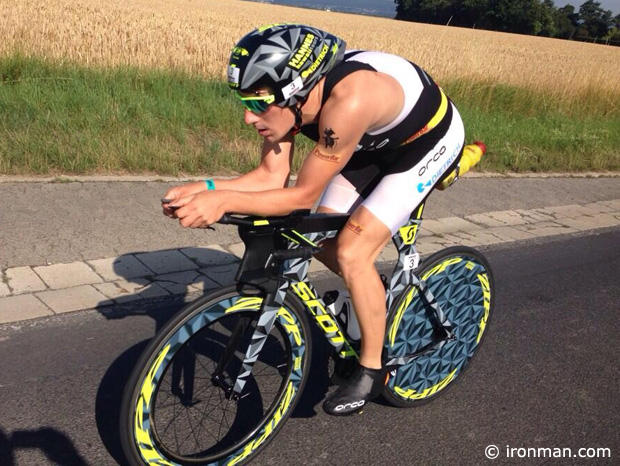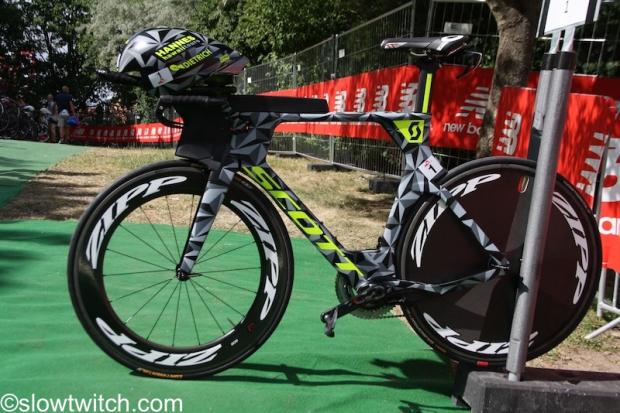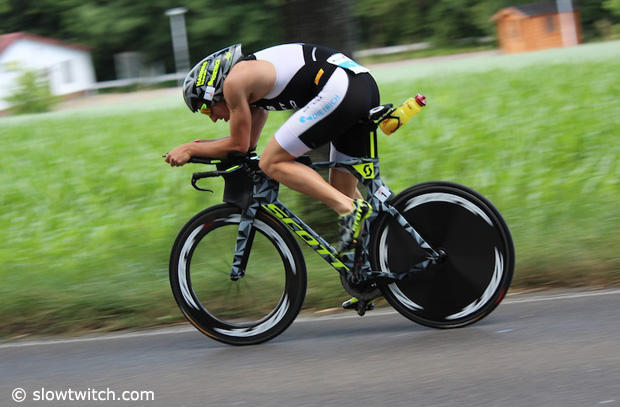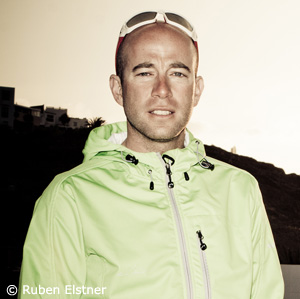The speedy Sebastian Kienle
2-time 70.3 World Champion Sebastian Kienle won the Ironman European Championships in Frankfurt recently and now this friendly and popular German Pro is getting ready for the crazy season. He has earned the right to race in Kona and Mont Tremblant, but he may focus on just one of them, or maybe even add HyVee to the mix. But wherever he chooses to race, he is a threat.
Slowtwitch: Hi Sebastian.
Sebastian Kienle: Hello Herbert.
ST: You recently won the Ironman European Championships in Frankfurt and you seemed to fire on all cylinders. Were you happy with your day?
Sebastian: Well, I kind of feel like most other elite athletes after a great victory, there are always things that could be improved on. My swim for one is still not where I would like it to be, but of course you also have to think positive too and not just focus on the negatives. I am of course super happy with my bike effort in Frankfurt, but that is something that is more or less expected from me. My marathon and how it came together was something that I was very thrilled with. I ran sub 2:50 for the first time and that was to some degree the sub goal for that race. So apart from a few minor details I was very happy with my day in Frankfurt.
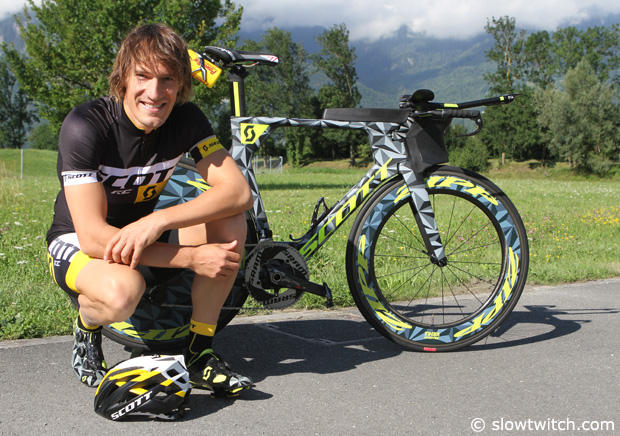
ST: What is the dilemma with the swim?
Sebastian: I have been working the last 2 years with the swim coach Jan Wolfgang, and this partnership has already gotten results, and that includes that swimming is now a much more enjoyable activity for me. We changed several items, for example I used to swim with a swim team, but now I mostly swim alone. Now there is also more differentiation between the different workouts, that means my easy workouts are actually easy and my hard ones hard. Looking at my splits in the pool I also had expected to reduce that disadvantage coming out of the water, but that is not what counts. People can also tell me about the great wattage numbers they get while riding on a trainer, but in the end it only matters what it says on the results page. I also have problems because of the faster guys in the race, and that means the initial push at the swim start is much quicker, and they know that it is a problem of mine. I basically still miss the base speed that would allow me to go with them at the beginning. And at times I have lost more time to others during the half distance 1.9k swim compared to some full distance 3.8k swims.
ST: How much of this is psychological?
Sebastian: For sure, I think because I actually know that I can swim faster and I know how important the swim result is for my race, I put pressure on myself even though I try not to do that. And compared to the other disciplines where you work harder and you thus get better results, that is not the case with swimming. Plus swimming is at the beginning when you are excited and nervous. So that is something I need to work on, not just in the water, but maybe on a leather sofa somewhere – to be better prepared mentally
ST: I believe you swam the Kraichgau course with your coach after the event. How did that go?
Sebastian: The good thing is that Jan is still a very strong swimmer, maybe not as fast as before, but he is very quick. We tried to simulate the race and I ended up swimming on his feet on that Kraichgau course, and in the end I was well faster than during the race. And of course this is all just theory and difficult to make a statement from that, especially because I had someone who pulled me the whole way. Kraichgau was actually not too bad, as I at least swam with the group with Timo Bracht, but you could at least see [during the swim with coach Wofgang] that the swimming without pressure of the race does go well. That I maybe think about the race too much.
ST: Did that effort at least make you feel better versus some time you may have clocked in the pool?
Sebastian: Of course, but as I said I typically swim better during the important Ironman events compared to 70.3 races. If you look closer at my swim times in Kona the last two years, they can certainly not be viewed as a catastrophe. I certainly did not count on getting out of the water with Andreas Raelert in both races. That certainly had to do with him having problems in the water and I surely having a good day, but that at least gave me a good and fine group. And that shows me that you can't just think about all this stuff negative, but clearly there is still work ahead.
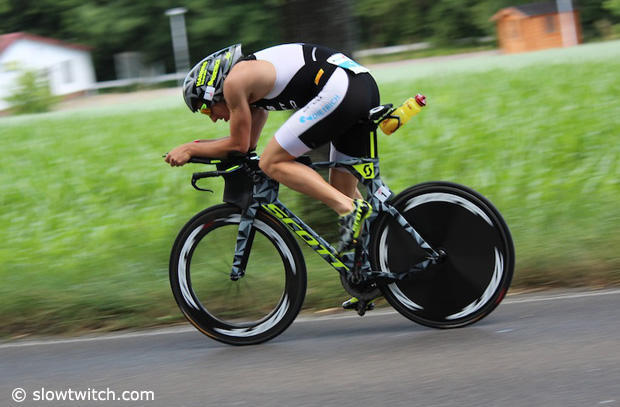
ST: The expectation of a great bike split, does that come from yourself or others?
Sebastian: It is surely something others expect from me. Bike splits are something I don't think about that much, but it is of course I great marketing tool – especially right now with the launch of the new Scott Plasma 5. But those who are heavily involved in the sport know that bike splits and records are dependent on conditions on that day, and also depend on the tactical action during the race. In Frankfurt there was no big group, and I mostly rode alone. That then helped to ride an even race. In Kona I first have to catch the group and I thus ride much harder than I would like to or should. I then sit a bit in the group to recover and then attack, and that makes for fast times. In Frankfurt the bike course has also changed at times with construction, and that makes it difficult to measure and compare performances.
ST: A few minutes ago you mentioned the marathon being a best effort. What was it before?
Sebastian: I believe the previous best was 2:52, but I am not completely sure, I just know I had not gone sub 2:50. I actually have always had the strong believe that I can run faster, but that is a bit of a dangerous thought. Because sometimes you are running in a race and think that you ought to be able to run faster, but it just won't go any faster in that Ironman. But I certainly believe that the potential is there to be quicker. I also think that I had more running speed in me in Frankfurt but in the end after you won no one cares about that detail.
ST: I guess you were not really pressured from behind during the run, so why give it all?
Sebastian: I do not want to say that I was able to save something for the next effort, because that is the worst thing one could do with someone like Frederik Van Lierde. My weaknesses actually match his strengths very well. My strength happens to be, and I am not sure if that could be considered a strength, that I run the early parts of the marathon very well, and Van Lierde is better at the end. So you can' really take your foot of the accelerator even with an 8 minute lead. It is difficult to say if a person challenging you at the end makes you run faster, because running along in the lead allows you to run smoothly with much confidence. That makes it a bit odd to make statements about what time might have been possible.
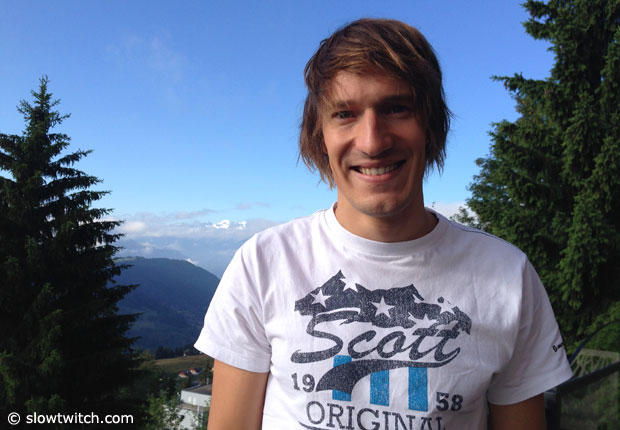
ST: Let us talk about the heat in Kona. Is that an issue for you?
Sebastian: Yes, it is warm in Kona, and of course folks suffer in those conditions, but I don't think that it hits me harder than others. So I do not think that it is a disadvantage for me. I have shown in a variety of events that I deal fine with either hot or cold conditions and I make it a bit of an obsession of mine to handle extreme temperatures both physically and mentally well. I showed that In Las Vegas, especially in the first year when it was very hot, and I handled it very well. And in Frankfurt it wasn't that comfortable, especially during the run at the end. The asphalt was still wet and as it warmed up the humidity levels rose to maybe not Hawaii like conditions, but not that far off.
ST: What will happen from now until Kona for you?
Sebastian: It is difficult to say now as I am not 100% certain yet. There are a few options, but we purposely kept the schedule post Frankfurt open. The first option would be 70.3 Worlds in Mont Tremblant, Canada and then Kona, the other option would be to race a 5i50 race to validate for the HyVee race, then Mont Tremblant and then Kona, and the third and final option would be to just go to Kona and nowhere else, or possibly just a small prep race. I personally would love to race them all, and I am someone who profits from that. Some folks would rather set their sights completely on Kona, but I don't think that you can save energy if you are not racing leading up to the big day. I saw with my prep with Heilbronn and Kraichgau that I actually gained an advantage from the hard effort of the races, but you then have to adjust your training schedule accordingly. So if someone races a lot and continues with the regular workouts, that person will suffer from those efforts. But if you adjust and do less in training, plus give yourself the chance to recover, the races can then be an asset on the path to Kona.
ST: Well, we wish you all the best with whatever you decide.
Sebastian: I am super thrilled about Kona this year, and obviously I was also happy about going there the last 2 years, but this year it will be even more exciting especially with someone like Frodo at the start. I would love it if I could split myself in half so I could watch the race and participate at the same time.
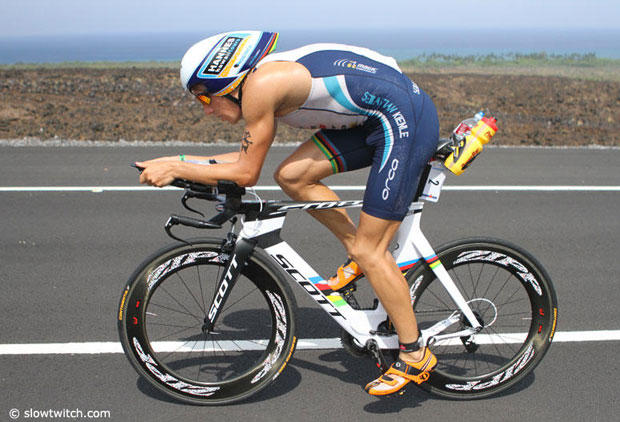
ST: That would be quite a feat.
Sebastian: [laughs]
Images 1, 3 and 4 © Herbert Krabel, image 2 © Karsten Täschner.


